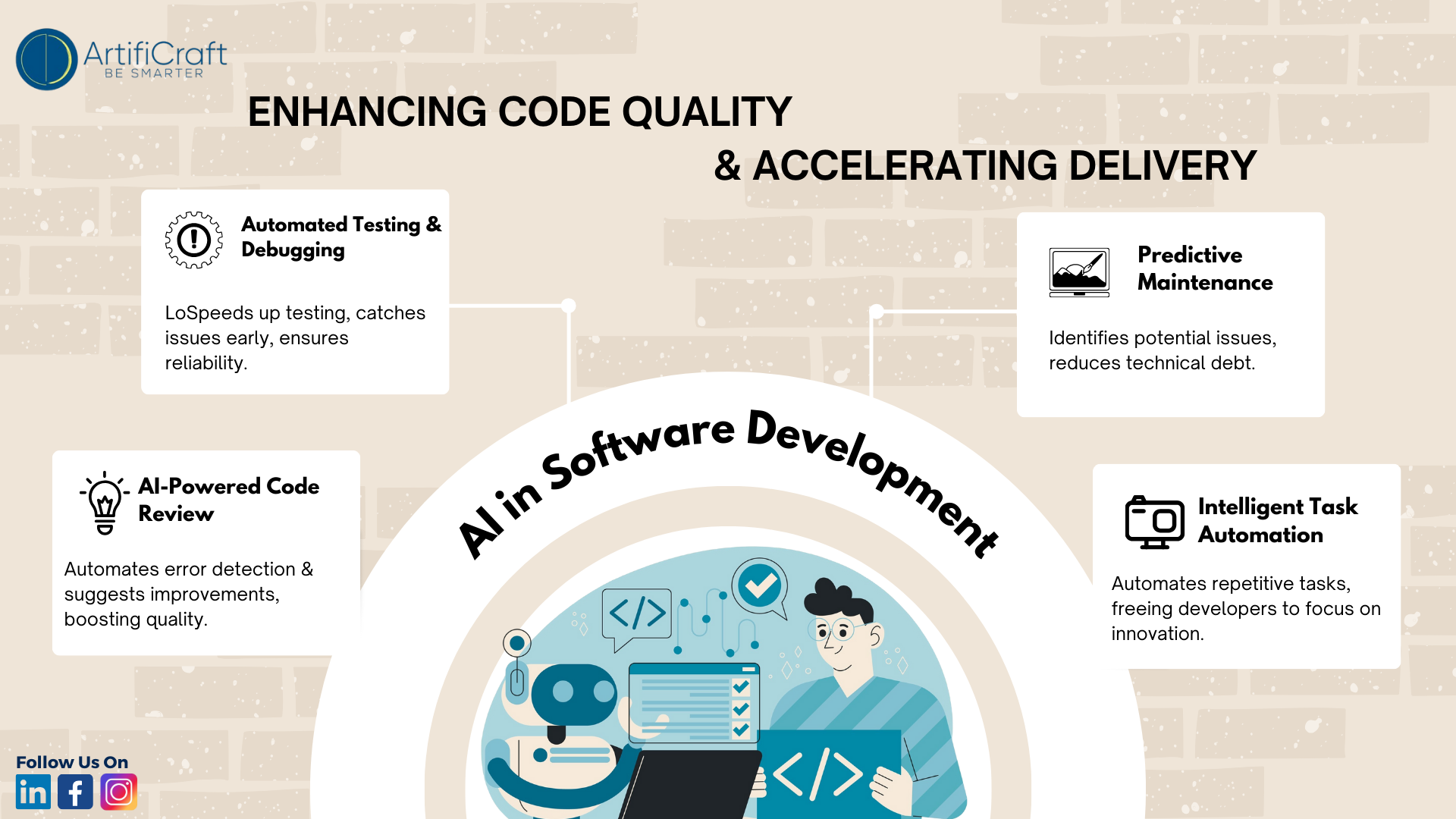AI in Software Development: Enhancing Code Quality and Accelerating Delivery
In the rapidly evolving world of software development, teams are continuously challenged to deliver high-quality code faster. Artificial Intelligence (AI) has emerged as a transformative technology, empowering developers and organizations to build better software in record time. From automating routine tasks to identifying potential issues before they arise, AI is reshaping the landscape of software development. Here’s a look at how AI is enhancing code quality and accelerating project delivery.
1. Enhancing Code Quality Through AI-Powered Code Review
AI-driven code review tools are a game-changer for software quality assurance. Traditionally, code reviews relied heavily on manual inspection, which could be time-consuming and prone to human error. Today, AI-powered tools analyze code for syntax errors, potential bugs, performance issues, and even adherence to coding standards.
For example, tools like DeepCode and Codacy use machine learning algorithms to scan through codebases, identifying code patterns that may introduce errors. These tools not only help developers catch issues early but also provide suggestions for improvements, which significantly reduces the number of bugs that make it to production. As a result, development teams can achieve higher code quality with reduced rework.
2. Automating Testing and Debugging for Faster Delivery
Testing and debugging are essential yet time-intensive stages of the development lifecycle. AI is automating these processes, helping developers test and debug code more efficiently. Machine learning algorithms can run thousands of test cases in minutes, simulating user scenarios that might take manual testers days to execute.
AI-based tools like Testim and Applitools can detect changes in code behavior and highlight potential issues across platforms and devices. By identifying errors at an early stage, AI-powered testing tools allow developers to fix issues faster, preventing them from escalating into larger problems. This automation not only accelerates project timelines but also improves the reliability and robustness of the final product.
3. Predictive Maintenance and Code Optimization
One of the biggest challenges in software maintenance is predicting issues before they occur. AI-driven predictive maintenance tools analyze code patterns, usage metrics, and error logs to forecast potential problems. This proactive approach helps teams identify modules that are prone to failure or parts of the codebase that may need optimization to improve performance.
For instance, AI models can detect memory leaks or excessive CPU usage that could lead to crashes or slowdowns. By addressing these issues in advance, developers can ensure a smoother user experience and reduce the time spent on troubleshooting. Additionally, predictive maintenance reduces technical debt, allowing teams to focus on new features rather than constantly revisiting old code.
4. Accelerating Delivery with Intelligent Task Automation
AI’s ability to automate repetitive, low-value tasks allows developers to focus on more complex and creative aspects of development. Intelligent automation tools powered by AI can handle everything from code formatting and refactoring to generating boilerplate code, freeing up developers to concentrate on core functionalities.
AI-driven platforms like GitHub Copilot assist developers by suggesting code snippets in real-time based on the project context. This speeds up coding, minimizes errors, and streamlines the development process. By automating these routine tasks, AI helps developers work faster and more efficiently, reducing the overall time to delivery.
5. The Future of AI in Software Development
The future of software development is poised to become increasingly AI-driven. As AI algorithms continue to improve, they will play an even more significant role in ensuring code quality, enhancing productivity, and accelerating delivery. From continuous integration and delivery (CI/CD) pipelines to enhanced project management, AI is expected to influence every aspect of the software development lifecycle.
Companies that leverage AI in their development processes will likely see greater efficiency, reduced costs, and the ability to meet demanding delivery timelines without sacrificing quality. For developers, AI provides a powerful ally that augments their skills, enabling them to create more reliable, innovative, and high-performing software products.
Conclusion
AI is transforming software development in profound ways, enabling developers to produce higher-quality code faster than ever before. Through automated code review, predictive maintenance, intelligent debugging, and task automation, AI enhances both code quality and project delivery times. As the technology continues to evolve, AI is set to become an indispensable tool in every developer’s toolkit, driving innovation and efficiency in the software industry.
